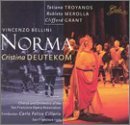| All Artists: Carlo Felice Cillario, Cristina Deutekom Title: Bellini: Norma / Cillario, Deutekom, Troyanos Members Wishing: 0 Total Copies: 0 Label: Gala Release Date: 6/6/2000 Genre: Classical Style: Opera & Classical Vocal Number of Discs: 1 SwapaCD Credits: 1 UPCs: 675754390624, 759547054822, 8712177032464, 675754390624 |
Search - Carlo Felice Cillario, Cristina Deutekom :: Bellini: Norma / Cillario, Deutekom, Troyanos
 | Carlo Felice Cillario, Cristina Deutekom Bellini: Norma / Cillario, Deutekom, Troyanos Genre: Classical |
Larger Image |
CD Details |
CD Reviews.... Anthony Louis | 07/09/2001 (4 out of 5 stars) "....As mentioned below- Clifford Grant is excellent- every bit the imposing father with his rich, huge voice. One wishes that the part were much larger. Merolla sings at a loud volume the entire time and muscles the character's limited coloratura.Troyanos is ...remarkable ... Her voice is a rich, dark miracle- luscious and sensual like the very finest red wine. It reminds me of the mahogany glory of Flagstad, imposing like hers, but yet vulnerable, and feminine even sexy. She certainly doesn't do anything inappropriate for the character of a deceived vestal virgin, but you can easily believe that she caught Pollione's eye. I doubt that Troyanos could have takne the gorgeous sensuality out of her voice if she tried. She has no trouble with the high notes or the coloratura- needing no aspirates: beautiful legato. She is the one who provides the lion share of vocal subtlety: dynamic shading, technically secure and dramatically sensitive phrasing: even without any artistry, her vocal color is so beautiful that it would have carried her through the performance and yet she misses not one opportunity for expression. The set is worth a far higher price for her singing alone.It is the impression that Deutekom leaves on the other listeners that puzzles me. I find her performance to be very uneven: yes, she gives her all dramatically, but not as much as Callas. Why must I compare her to Callas? Deutekom has some of the same acid in her voice, and many many times on this recording she sounds like a brighter-voiced Callas. More troubling are a couple of entrance mistakes and more times when her intonation strays too far south.However, in the plus column, she does make a dramatic impact, especially in the long recit sections in Act 2 and the ensemble finales, and unlike Callas's later recordings, she has some big high notes- one or two are not quite in tune and sound like they are hanging on by a thread, but if you choose to look at it as Norma's highly agitated state of mind, it isn't really a problem. Yes, this is bel canto, but it's some of the most dramatic bel canto, and I'd rather hear an exciting Norma as opposed to a beautifully sung but boring Norma. Deutekom only a couple of times indulges in that strange gobbling coloratura that she is notorious for, proving that she can indeed sing coloratura in a more traditional way. She follows Merolla's lead of forcing her way through the coloratura in the trio, but only that once. Also too her credit, she pulls out a few soft high notes in some critical moments- they are variable, but mostly successful, always effective and you have to give the woman credit for going out on a limb in a live performance.I wouldn't call this the finest Norma ever, but ...it certainly doesn't have to be your only copy of the work." The "Norma" recording of the century! madamemusico | Cincinnati, Ohio USA | 04/07/2000 (5 out of 5 stars) "I can only echo the words of praise found in the other reviews. Deutekom and Troyanos are at their absolute peak here, Morolla and Clifford Grant are wonderful "finds," and Cellario conducts with fire and excitement. If you listen to opera because you want catharsis, look no further. This set will transform you, and at this price you can afford to send a couple of copies to your friends (hint, hint)." Good performance, mediocre to poor sound quality Anthony Louis | USA | 08/04/2001 (3 out of 5 stars) "There is something not right with the sound quality on this CD. The performance is rather good, but after a while the sound gets to be grating, especially the female voices. I have heard Troyanos live and her voice is quite pleasant to listen to. On this CD I found her voice to be irritating, so it must be the recording. I doubt I will listen very often to this particular recording. There are more enjoyable Normas out there, so I would be hard pressed to recommend this one."
|
